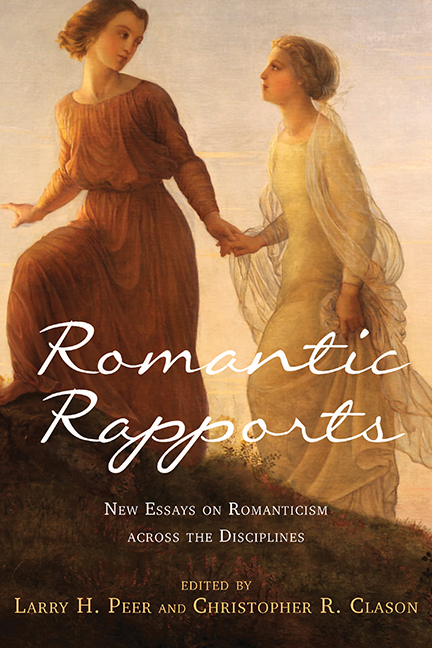Book contents
- Frontmatter
- Dedication
- Contents
- Acknowledgments
- Introduction: The Polyvalence of Romanticism
- Part I Romanticism and the Literatures
- Part II Romanticism, Music, and the Visual Arts
- Part III Romanticism and Science, Technology, Philosophy
- 7 A Romantic Scientist in Percy Shelley's Alastor
- 8 Canines and Other Quadrupeds: Human and Animal Relations Staged in Romantic Drama
- 9 Goethe and Individuation
- Notes on the Contributors
- Index
7 - A Romantic Scientist in Percy Shelley's Alastor
from Part III - Romanticism and Science, Technology, Philosophy
Published online by Cambridge University Press: 30 August 2017
- Frontmatter
- Dedication
- Contents
- Acknowledgments
- Introduction: The Polyvalence of Romanticism
- Part I Romanticism and the Literatures
- Part II Romanticism, Music, and the Visual Arts
- Part III Romanticism and Science, Technology, Philosophy
- 7 A Romantic Scientist in Percy Shelley's Alastor
- 8 Canines and Other Quadrupeds: Human and Animal Relations Staged in Romantic Drama
- 9 Goethe and Individuation
- Notes on the Contributors
- Index
Summary
TRADITIONALLY, ROMANTICISM IN LITERATURE is recognized for its emphasis on the imagination and creativity, and therefore not on its contributions to the development of science, with its emphases on sobriety and objectivity. Yet both the literature and the science of the eighteenth and early nineteenth centuries are inherently linked and work together to contribute to our understanding of the evolving identity of the persons practicing science. Thus in Romanticism's early nineteenth-century heydey they moved out of the traditional role of natural philosophers and became more professionalized as men of science. The purpose of this investigation is to highlight the importance of Romantic literature in the emerging identity of the scientist, as these individuals came to be called. In today's culture it is customary to assume that the great divide between science and literature, or science and the humanities, has always existed: that science and literature are not linked and that literature plays virtually no role in new and developing technologies. Yet such assumptions are shortsighted and dismiss a history of interconnectedness, in which the practitioners of science and the commentators on society and politics in literary writing were the same individuals. This is particularly true of Romantic literature and science.
One can see this process of constructing a divide between science and the humanities unfolding gradually over the past two centuries, beginning perhaps in the Victorian period with the debates regarding education between Matthew Arnold and Thomas Huxley. By 1959, however, it had reached a level sufficiently critical to elicit a warning. In that year, C. P. Snow attempted to dissuade society from continuing down a road that divided and isolated the sciences and the humanities. Snow, a trained scientist and accomplished novelist, gave a lecture entitled The Two Cultures and the Scientific Revolution, which was later published as a monograph. Through observations of his own interactions in the differing fields, Snow claimed that “the intellectual life of the whole of western society is increasingly being split into two polar groups….
- Type
- Chapter
- Information
- Romantic RapportsNew Essays on Romanticism across the Disciplines, pp. 123 - 137Publisher: Boydell & BrewerPrint publication year: 2017

